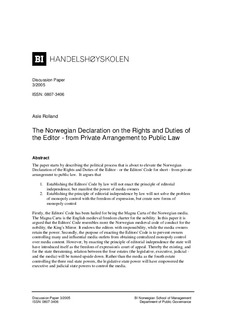The Norwegian Declaration on the Rights and Duties of the Editor - from Private Arrangement to Public Law
Working paper
Permanent lenke
http://hdl.handle.net/11250/94027Utgivelsesdato
2005Metadata
Vis full innførselSamlinger
- Discussion Papers [30]
Sammendrag
The paper starts by describing the political process that is about to elevate the Norwegian Declaration of the Rights and Duties of the Editor - or the Editors' Code for short - from private arrangement to public law. It argues that
1. Establishing the Editors' Code by law will not enact the principle of editorial independence, but manifest the power of media owners
2. Establishing the principle of editorial independence by law will not solve the problem of monopoly control with the freedom of expression, but create new forms of monopoly control
Firstly, the Editors' Code has been hailed for being the Magna Carta of the Norwegian media. The Magna Carta is the English medieval freedom charter for the nobility. In this paper it is argued that the Editors' Code resembles more the Norwegian medieval code of conduct for the nobility, the King's Mirror. It endows the editors with responsibility, while the media owners retain the power. Secondly, the purpose of enacting the Editors' Code is to prevent owners controlling many and influential media outlets from obtaining centralized monopoly control over media content. However, by enacting the principle of editorial independence the state will have introduced itself as the freedom of expression's court of appeal. Thereby the existing, and for the state threatening, relation between the four estates (the legislative, executive, judicial - and the media) will be turned upside down. Rather than the media as the fourth estate controlling the three real state powers, the legislative state power will have empowered the executive and judicial state powers to control the media.
Serie
Discussion Paper03/2005
